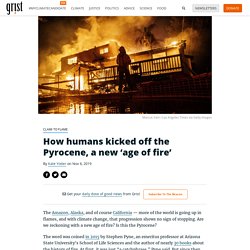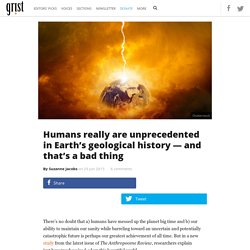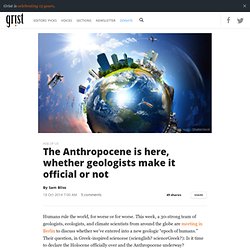

Le « jour du dépassement » a reculé de trois semaines sous l’effet du Covid-19. Et on peut en tirer des leçons Publié le 22 août 2020. Ce samedi l’humanité aura consommé plus de ressources naturelles que la Terre peut renouveler en 12 mois : le symbolique « jour du dépassement » recule pour une fois cette année, sous l’effet de la pandémie de Covid-19, mais ce n’est pas une bonne nouvelle avertissent ses promoteurs.

Le « Overshoot Day » selon son nom anglais, calculé depuis 2003 par l’ONG américaine Global Footprint Network, a pour but d’illustrer la consommation toujours plus rapide d’une population humaine en expansion sur une planète limitée. Pour le dire de façon imagée, il faudrait cette année 1,6 Terre pour subvenir aux besoins de la population mondiale de façon durable. Le « dépassement » se produit quand la pression humaine dépasse les capacités de régénération des écosystèmes naturels et ne cesse selon l’ONG de se creuser depuis 50 ans : 29 décembre en 1970, 4 novembre en 1980, 11 octobre en 1990, 23 septembre en 2000, 7 août en 2010. How humans kicked off the Pyrocene, a new ‘age of fire’
The Amazon, Alaska, and of course California — more of the world is going up in flames, and with climate change, that progression shows no sign of stopping.

Are we reckoning with a new age of fire? Is this the Pyrocene? The word was coined in 2015 by Stephen Pyne, an emeritus professor at Arizona State University’s School of Life Sciences and the author of nearly 30 books about the history of fire. At first, it was just “a catchphrase,” Pyne said. But since then, he has started to take it more seriously. “We went to the top of the food chain because we learned to cook landscapes,” Pyne wrote in an essay. This “fire age” is reshaping our planet much like the last ice age carved out our rivers and lakes. Humans really are unprecedented in Earth’s geological history — and that’s a bad thing. There’s no doubt that a) humans have messed up the planet big time and b) our ability to maintain our sanity while barreling toward an uncertain and potentially catastrophic future is perhaps our greatest achievement of all time.

But in a new study from the latest issue of The Anthropocene Review, researchers explain just how much we’ve f-ed up this beautiful world. “We think of major changes to the biosphere as the big extinction events, like that which finished off the dinosaurs at the end of the Cretaceous Period. But the changes happening to the biosphere today may be much more significant,” Mark Williams, a geologist from the University of Leicester and leader of the study, said in a press release. Indeed, Williams and his colleagues claim that not since the evolution of photosynthetic microbes or multicellular animals has the course of Earth’s ecosystem changed so much.
“But what is really new about this chapter in Earth history, the one we’re living through?” La civilisation mise au défi par l’anthropocène. The Anthropocene is here, whether geologists make it official or not. Humans rule the world, for worse or for worse.

This week, a 30-strong team of geologists, ecologists, and climate scientists from around the globe are meeting in Berlin to discuss whether we’ve entered into a new geologic “epoch of humans.” Their question, in Greek-inspired sciencese (scienglish? ScienceGreek?) : Is it time to declare the Holocene officially over and the Anthropocene underway? Our question, in plain English: Does it even matter what these highbrows decide?
Popular discourse and scientists of every stripe aren’t waiting around for a royal decree from the egghead society to declare the Age of People a real phenomenon. The big bureaucratic body that makes decisions about geologic time periods — the International Commission on Stratigraphy — responded to the overwhelming adoption of a term they’ve not formally approved by setting up this Anthropocene Working Group and giving it until 2016 to hash out a proposal. #xtor=EPR-32280229-[NL_Titresdujour]-20120307-[titres]#xtor=EPR-32280229-[NL_Titresdujour]-20120307-[titres]#xtor=EPR-32280229-[NL_Titresdujour]-20120307-[titres] Le Monde.fr | • Mis à jour le | Par Audrey Garric - Le Chefresne (Manche), envoyée spéciale Quand il a appris que la ligne à très haute tension (THT) Cotentin-Maine allait passer dans son village, Jacky Chardin a cru défaillir.
![#xtor=EPR-32280229-[NL_Titresdujour]-20120307-[titres]#xtor=EPR-32280229-[NL_Titresdujour]-20120307-[titres]#xtor=EPR-32280229-[NL_Titresdujour]-20120307-[titres]](http://cdn.pearltrees.com/s/pic/th/vecu-sous-ligne-haute-tension-24536126)
"Pas une seconde fois", a-t-il soufflé, avant de se précipiter à la mairie du Chefresne, bourg de trois cent dix âmes au centre de la Manche, pour se renseigner sur le tracé exact du futur ouvrage. Finalement, les pylônes et câbles seront dressés à cinq bons kilomètres de sa propriété, une charmante maison toute de pierres, surplombant un terrain où pâturent quelques bêtes. La planète, la modernité et nous (2/4). Philippe Descola: «D’autres manières de composer des mondes» - Page 3. La planète, la modernité et nous (1/4). Comment penser la révolution climatique - Page 3.